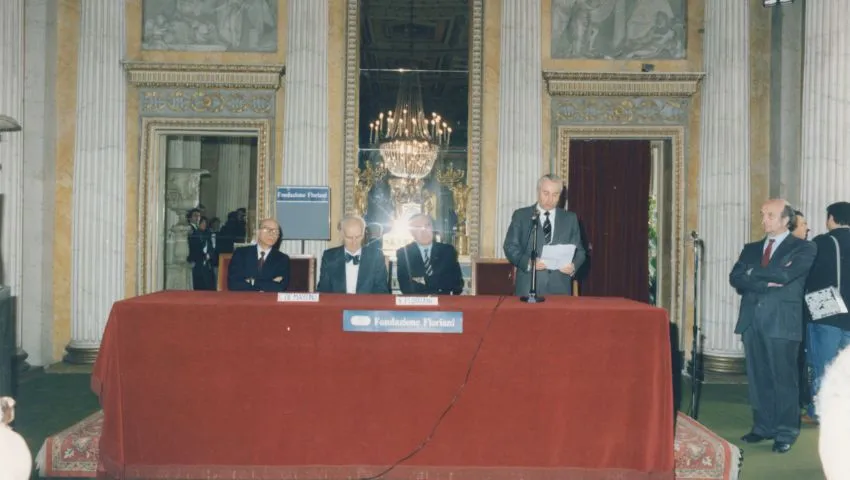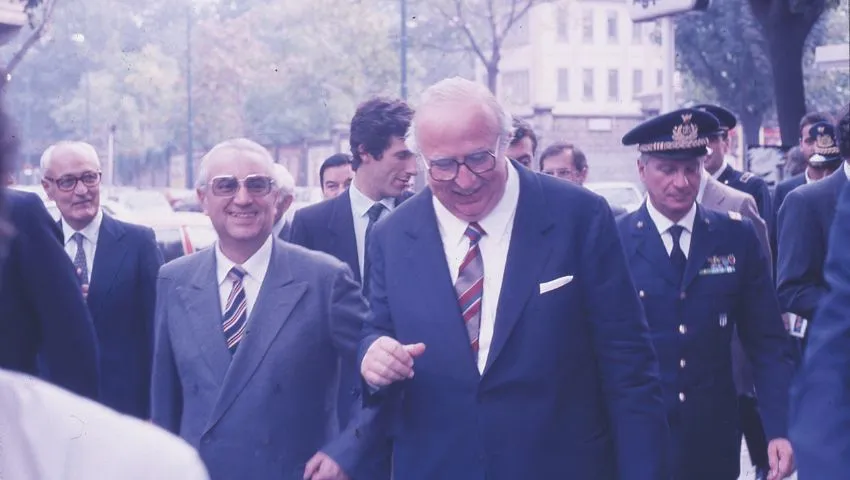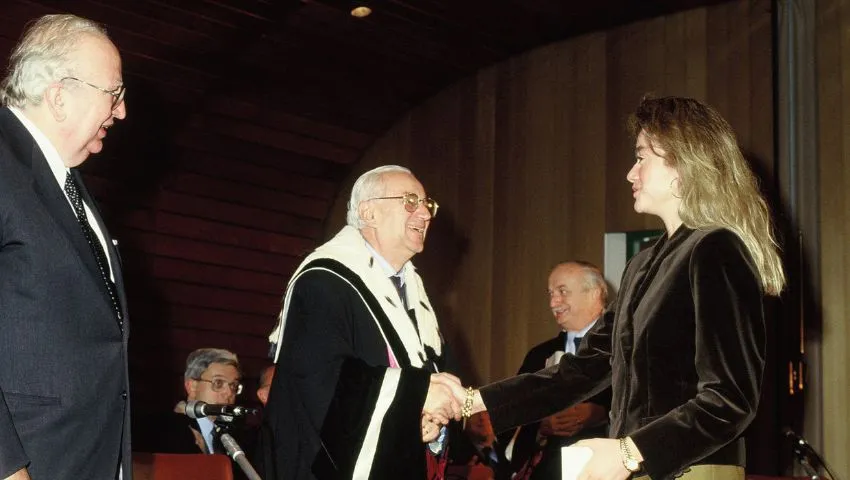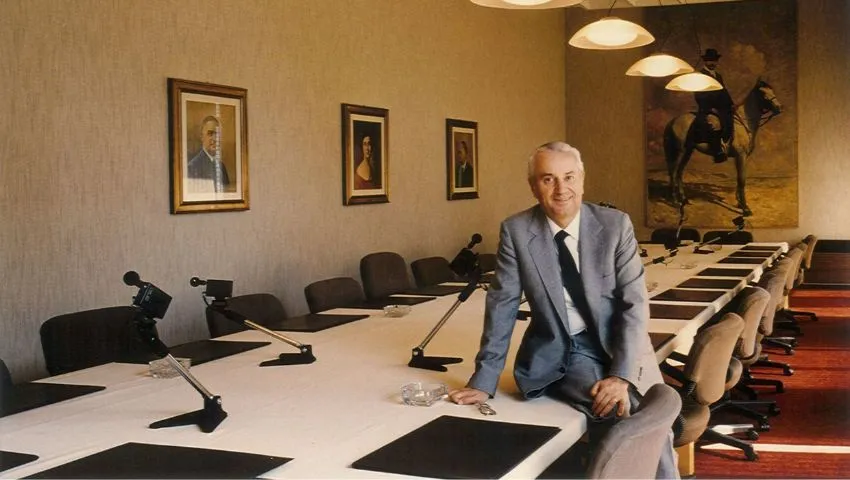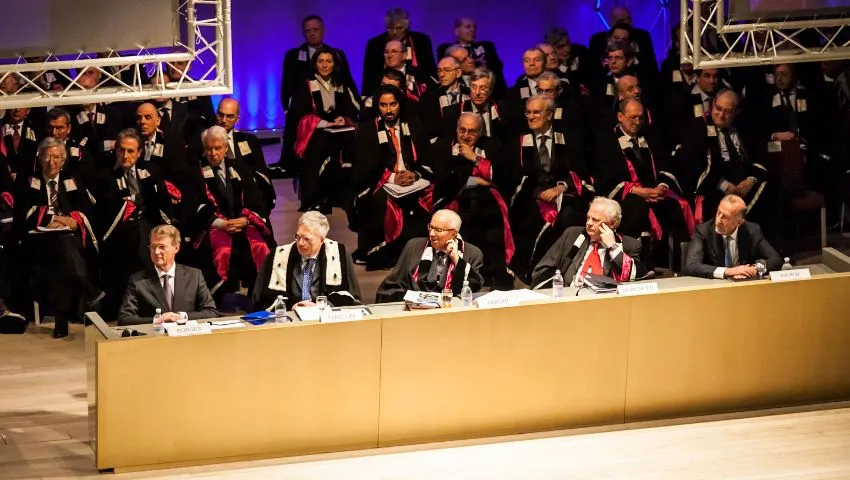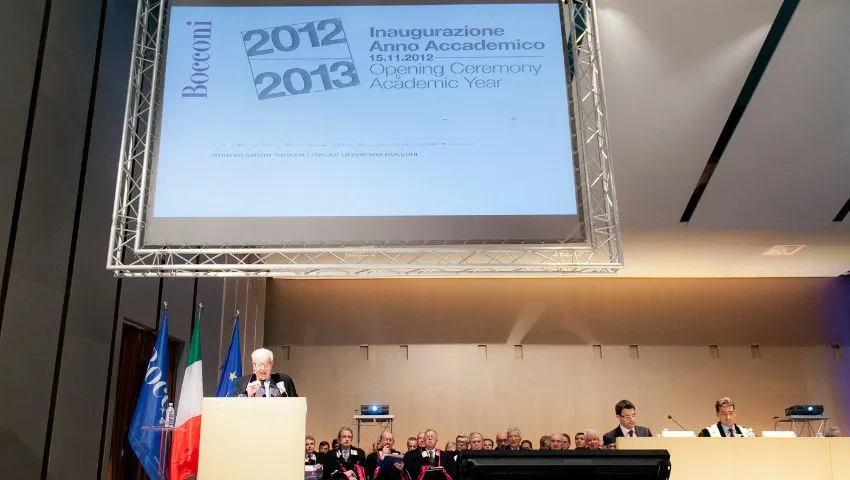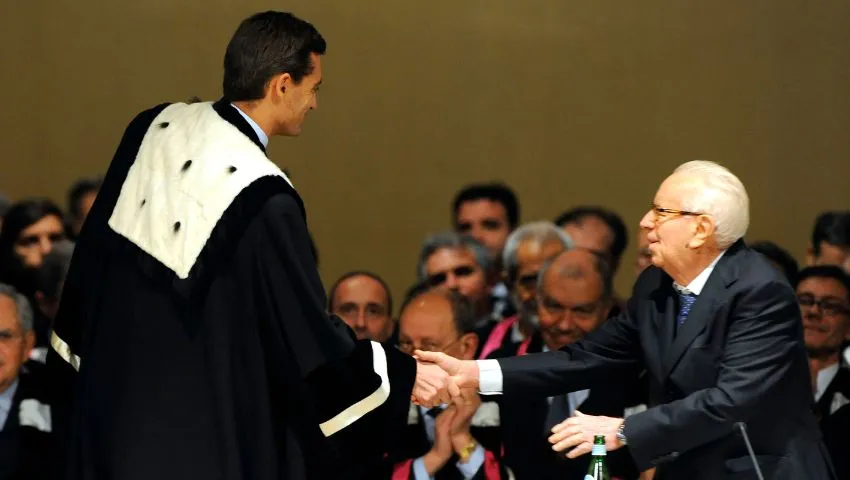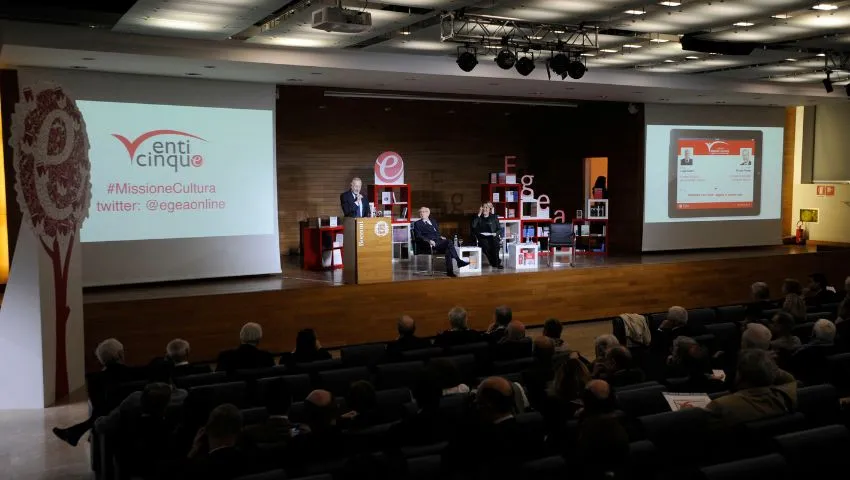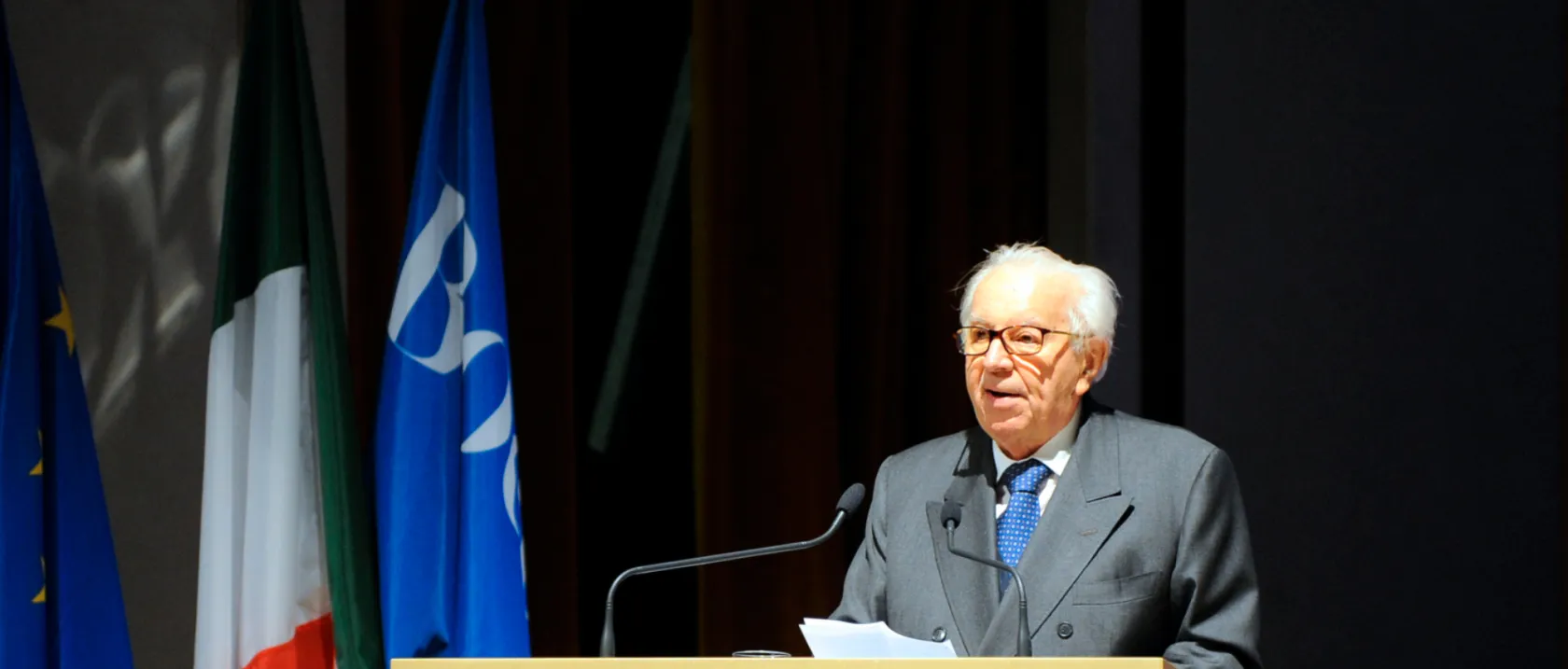
Luigi Guatri, This Is How We Saw Him
With deep sadness, the Bocconi University community is coming together to remember Professor Luigi Guatri, who passed away yesterday evening, Thursday 6 February, at the age of 97. He has made a permanent mark on the history of the university and the Italian business economy, leaving an invaluable legacy.
A Life Dedicated to Academia
Born in Trezzo sull'Adda on 19 September 1927, Luigi Guatri graduated with honors from Bocconi University with a degree in Economics and Management in 1949. Studying under the famous economist Gino Zappa, he began his academic career as an assistant to the professor of General and Applied Accounting. He taught at the University of Genoa and the University of Parma, and in 1969 he returned to Bocconi as a Full Professor, holding roles of increasing responsibility: director of various institutes, Managing Director from 1974 to 1999 ("difficult times for Bocconi's finances, these were also the years of the banker Roberto Calvi, at the time Vice President under Giovanni Spadolini's presidency,” wrote Guatri), Rector from 1984 to 1989 and Vice President from 1999 to 2018. In 2003, the Italian Ministry of University and Scientific Research named him Professor Emeritus. In June 2005, Professor Guatri was appointed President of the Amici della Bocconi Association, a position he held until 2018, when he was appointed Honorary President of both the Javotte Bocconi Institute and Bocconi University.
Guatri also founded the publishing house Egea in 1988. after serving as its President for several years, he then became Honorary President.
Scientific and Professional Contributions
A pioneer in the study of business valuation, Guatri stressed that "it is never a mechanical application of criteria and formulas. In addition to a series of conceptual tools and information, the company, its policies and its strategies must be understood in order to put together a credible valuation. Along with an understanding of how to frame the company in the system in which it operates." On a professional level, his activity as a chartered accountant – which began in 1950 – led to his involvement in the valuation of over 300 businesses, listed companies and credit institutions. He founded the Studio Prof. Luigi Guatri, which became a point of reference for economic evaluations in Italy.
Zappa and His Mentors
Guatri was among the last students – along with "his lifelong friend" Tancredi Bianchi – of Gino Zappa, considered the father of business economics in Italy. "Zappa thought highly of me (perhaps too highly)," wrote Guatri in Nostalgia. “In 1951 he told me that I should apply for a professorship. I pointed out to him that I was not yet 24 years old and had graduated two years earlier. It wasn’t open to discussion: I had to apply. Masini and Rossi applied at the same time. I was not given the professorship, but I was declared ‘ready’: this decision was worth much more than a professorship. And it opened the doors to me to teach Management and Sales at the University of Genoa (it was the time of Professor Aldo Amaduzzi)." Guatri himself then lists other mentors of his: Ugo Caprara, Giordano Dell'Amore, Giorgio Pivato, Giovanni Demaria and Libero Lenti.
The World as Seen by Guatri
Throughout his career, Professor Guatri collaborated with numerous prominent personalities in the economic and academic landscape. One of the episodes that best illustrates his capacity for vision and pragmatism occurred during the Mediobanca crisis of the ‘80s: his technical contribution to business valuations was decisive for the definition of key strategies.
As an expert and sophisticated observer of the worlds of business, finance and academia, he shared his wisdom in the series of essays Li ho visti così published by Egea. It was divided into three volumes (volume 1, volume 2, volume 3), followed by the publication of Vite vissute. The result is a vivid cross-section of the transformations of the national economic fabric through his direct experiences with 57 leading players in university, business and banking from the past half century. "I agreed to write about these experiences," Guatri emphasized at the end of the first volume, "because of my love of forging new paths, a love that has not yet faded. In the name of rigorous objectivity – a requirement for any scholar – I faced the risk of attracting antipathy and excommunication. This is a risk that is never run when dealing with theories, models and formulas: which are of interest to few and never hurt anyone.”
The Legacy of a Mentor
The death of Professor Luigi Guatri leaves a deep void in the academic and professional community. His legacy lives on in his books, in his teachings and in the impact he had on students, colleagues and professionals whose memories and testimonies we have collected below.
Our age difference prevented me from meeting Luigi Guatri when he was still professionally active at Bocconi and outside our University. I remember him with affection and with great esteem and respect. In President Mario Monti’s absence – who was involved in governing the country – it was he who asked me to take on the role of Rector, and in his words, I still remember the sense of the great responsibility he attributed to me on that occasion. In the numerous roles he has taken on at Bocconi over 70 years – Professor, Researcher, Rector, Vice President, Honorary President, President of the Javotte Foundation – he has fundamentally contributed to our University’s growth and development, as well as defending its independence.
For our part, we will do our utmost to honor his commitment and his memory.
I met Luigi Guatri as a student, in the first year after his return to Bocconi as Professor of Management and Sales. I remember that, like my classmates, we immediately appreciated his expertise, the new course content and, as a scholar, his being at the forefront of the main issues of the time.
I then had many opportunities to collaborate with him as Managing Director of Bocconi (1974-1999) and during his Rectorate (1984-1989), especially in further internationalizing Bocconi. He always followed this project closely, providing valuable support, also finding time in his busy schedule to participate in several important trips abroad (including traveling to Argentina and Japan), as well as various activities with our international partners held at Bocconi. Thanks to his constant input and support – also in harmony with the previous and subsequent Rectors (Innocenzo Gasparini and Mario Monti, respectively) – Bocconi pioneered important innovations that were then adopted by the entire Italian university system – and not only in this area.
Then, during my time as Rector, I always maintained a constant dialogue with him, benefiting greatly from his experience and his wisdom at the service of the development and proper functioning of our University.
I had not known Prof. Guatri, if not as an influential name in the academic and professional world.
In 1985 I surprisingly received an invitation to an interview which was followed by a professional assignment at the University: a collaboration that – with different contents and methods – continued in the following years, until today.
Working directly with Prof. Guatri was... a dissertation of the highest level, a personal and professional experience that allowed me to get to know the scholar, professor, professional and – at the same time – person always attentive to the problems of society and people, capable of ranging between various problems and always with a lucid ability to analyze, scrutinize and project into the future. A person of great humanity.
He was granted so many awards, both official and institutional, that he had never asked for or solicited, as well as proposals for prestigious positions that he had often refused. He was shy in appearance, loyal in relationships, attentive at all times to the sensitivities of others, and incapable of holding grudges.
One of his teachings, to which he always stayed true, was “to remember that people come before budgets.” And I have never forgotten that.
I arrived at Bocconi in the mid-‘60s as an assistant to a law professor. I, like my mentor, were not Bocconians. I met Professor Guatri at a graduation session, which was also attended by some very young people. Professor Guatri approached me before I could approach him and politely welcomed me as if we had known each other for years. I immediately felt at ease. Subsequently, working with Professor Guatri both at Bocconi and in a professional setting was intense. The characteristics of that first meeting never changed. Very friendly, great restraint, of few words that were always to the point and decisive, no displays of supremacy. His style went against the tide compared to many illustrious professors and great professionals of the time. Working with Professor Guatri has enriched me enormously from a scientific point of view. As a lawyer, I was outside the world of business, of valuations in particular. Jurists dealt with issues that involved business knowledge and economics with carelessness and superficiality. Thanks to Professor Guatri I discovered a whole new world, in areas unknown to jurists at the time, and my studies have benefited greatly from it. Professor Guatri, therefore, was not only a great innovator in his subject areas, but he was also able to sow innovation in contiguous fields, such as law.
It is difficult for me to find the right words for a personal memory of Prof. Guatri. I would simply say that he was a genius and anyone who, like me, had the good fortune to collaborate scientifically with him was able to grow under his guidance. He was not my first mentor, but after my return from the United States where I had been a Visiting Professor for a semester in 2000, he asked me to meet and proposed that we write a book together on multiples in the valuation of companies. It was the first of a long series of volumes written together.
Prof. Guatri was clear thinking, probing and focused, he went to the heart of the most complex problems and knew how to present them in the simplest form, so listeners would be aware they were speaking with an expert in business valuation who was able to see what others did not see. Despite his scientific superiority, he loved debating, including outspoken exchanges. Like all wise men, he knew he didn't know everything, loved to discuss anything new and was open to innovation.
He hated wasting time. Our meetings were always quick. We would discuss problems, debate and say goodbye to get back to work. He was an extraordinary co-author. I remember summers and winters when I was here in Italy and Prof. Guatri was in Santo Domingo, exchanging emails daily. I would send what I had written and vice versa. Thanks to the time difference, we worked 24 hours a day. There was a 30-year age difference between me and the Professor, but his productivity was so high that he was often the one who left me behind.
Prof. Guatri thought of the role of Professor in a modern sense. Research should impact reality. The Italian Evaluation Body (OIV), the Italian standard setter in the field of evaluation, was founded based on this viewpoint. The OIV is now a national standard setter that is respected and followed internationally, it collaborates systematically with the IVSC. It is thanks to the Scuola del Valore’s prominence, a school founded by Prof. Guatri that today I hold the position of Co-Chair of the IVSC Academic Forum. It is a recognition of the importance of what the field of study developed by the Professor also holds at an international level.
He always showed great compassion. When my father passed away, he attended the funeral and wrote me a moving message. He wanted to share his affection. I will be forever grateful to him.
Prof. Guatri's passion was the game of golf. Once in the early 2000s he told me that if I wanted to start playing golf, I was close to the age limit, because starting later would not allow me to gain the necessary agility. It was his only advice I didn't follow, as I was interested in other sports.
Dear Prof. Guatri, we will continue your studies and your much-loved subject area will progress thanks to the solid foundations to which you have anchored us. Thank you, Professor.
In addition to the many small episodes of our academic and professional work, the things that come to mind most when I think of Luigi Guatri are first his human side, which was perfectly combined with his scientific and intellectual side.
On a human level, Professor Luigi Guatri had the invaluable merit of playing down the most critical situations and of facing any problems that arose lightheartedly and with deep respect for others.
On an intellectual level, the Professor's great gift was the ability to simplify and focus attention only on the truly important aspects of the situations he had to face. This ability was the result – in addition to his mental approach – of the deep knowledge of the issues brought to his attention acquired through study and extensive experience.
When we were asked to write a scientific paper or a technical memoir, I remember he would repeat to me that our arguments and explanations had to be understandable to every reader, even non-experts. And he added that arguments that are too complex and intricate most of the time hide an insufficient knowledge of the topic to be discussed.
The mental approach that distinguished him allowed Luigi Guatri to write treatises and textbooks – and not only in the financial and valuation fields that were most congenial to him – which remain cornerstones even after many decades.
I met Professor Luigi Guatri in 1973, attending his course at Bocconi. I did not imagine then that he would be my mentor and guide for almost 50 years. His brilliant mind and deep humanity captivated me immediately. I fondly remember 1977, when, during my first lecture, his unexpected presence transformed my presentation into an exam. Since then, every moment I exchanged with the Professor has been a source of fascination and deep gratitude for me. Later, my intellectual and personal bond with him was further strengthened, especially when in 1984 he entrusted me with the updating of his book. His decision to include my name as a co-author was an unexpected and invaluable recognition. For almost 50 years, Professor Guatri was a mentor and a role model. Thank you, Professor. My gratitude and my prayers will always be with you.
For me, the loss of Prof. Guatri provokes great sadness, even if his memory will live on forever. In addition to his academic and professional teachings, I was able to enjoy some of his moments of measured affection, from which one could see a person capable of great sensitivity on a human level. A sensitivity that has remained over the years, even when he no longer taught. It was a great honor to be one of his students, in academia and at work. He had so much to teach, and knew how to do so with the simplicity and clarity of someone who had achieved deep knowledge of the topic at hand. Perhaps the goal of clarity is the greatest lesson that many of us have received – a goal that always pushes you to study and analyze. Thank you, Professor. Your example and teachings will remain forever.
I will never forget Luigi Guatri, and will be forever grateful for the guidance he offered to Bocconi and to me personally. His great humanity, deep expertise, spirit of service, ability to generate vision, clear-headedness, pragmatism, ability to manage complex situations: these are his characteristics that immediately come to mind. But the lesson I have drawn first and foremost is this: knowledge comes from critically examining action and its value is shown by completing the action itself. The happiest moments of our extensive work together always concerned both a commitment to research and practical service rendered to the country’s business world.
I have many memories of the times I worked with Prof. Guatri, which marked my career path and left an indelible mark on my education.
From our first meetings I was struck by his approachability and the trust he placed in young people, in whom he saw the future. Although he was very involved in the top management of the University – which he shaped in the various stages of its development for over 60 years – he always found time for continuous learning.
During the last year of his teaching, he asked me to accompany him to the classroom and, blaming fatigue, he proposed that I lecture the students after a brief introduction. He told me: "I too was younger than my students at the beginning."
In research as in my profession, I always admired his unparalleled qualities: making even-keeled decisions, his ability to simplify problems, to write clearly and to make even the most complex topics understandable.
Another aspect that always set him apart was his ability to create heterogeneous working groups to address new issues and problems. This was the case when launching the journal La valutazione delle Aziende and the various research groups that were pioneering at the time on Intangible Assets, Quality in Valuations and Valuation Guidelines.
He always maintained a positive and constructive approach with everyone, even anyone who may have shown themselves to be ungrateful over time. He was always courteous and calm, even in the most critical situations. His children have told me the same, saying they never heard him raise his voice.
I only had a few opportunities to speak with Professor Guatri. But they were valuable ones. His Bocconi was always at the center of the conversation, and inevitably also the book he happened to be writing at the time. It was an important privilege for me to witness his last visit to the Rector’s office. We were together in the office that used to be his – one of the places where he built the history of our university – discussing the future. Thank you, Luigi, for your enormous, constant and decisive role in defining and building your – our – Bocconi.
In 1988-1989, along with CEPR and NBER, Bocconi was looking into establishing a new research center, which later became the Innocenzo Gasparini Institute for Economic Research (IGIER). At that time, Prof. Guatri, then Rector of Bocconi, observed that the initiative could seem incompatible with the university’s work streamlining and reducing the number of research centers. Mario Monti explained the project to him and Prof. Guatri had no doubts in concluding that it was an important step in Bocconi’s internationalization and that it should certainly be continued. Since then he never failed to support IGIER. That episode is, in my opinion, an example of his foresight and his expertise – despite his origins in a different academic department – to understand which direction Bocconi should take.
Professor Luigi Guatri was a special man because he was Bocconi. If he had not had the courage and perseverance to radically reform our University at the end of the ‘60s, today Bocconi would not be one of the leading international universities and a national pride. I had the privilege of having been his student. Professor Guatri was our mentor, he was our Magis, that "something more" who communicated to us the genuine pleasure of learning because what we learn is for a lifetime.
Sending an affectionate and respectful embrace to our unforgettable Professor and mentor.
I worked with Alberto Dondena in 1966-1976 as a professional expert in financial statements and then as a client of the bank I managed. Therefore I also met his son, Carlo Francesco.
In addition to time as a student and my work with ALUB, I saw first-hand the love that Prof. Guatri has always had for our University as well as his strong compassion when Alberto Dondena gave a gift to our University to establish the "Research Center on Social Dynamics and Public Policy". He would dedicate the center to his son, Carlo Francesco, who graduated from Bocconi with honors with a degree in Economic and Social Sciences. At a meeting in the Boardroom after the deed of donation, Prof. Guatri expressed to Alberto – on behalf of Bocconi – deep gratitude for his noble gesture and, expressing emotion, his feeling of personal and professional friendship with Alberto.
For me, this is the best memory of Prof. Guatri, who will always live on in my memory.
Prof. Monti and Mr Pavese matched Prof. Guatri's words with equal intensity, creating a pleasant atmosphere for everyone present.
60 years ago, a young Assistant Professor who had recently started at the University of Parma was invited with several other faculty members to attend a lunch where a colleague was celebrating her promotion. In an organization where roles were very separated, he wandered into the room awkwardly, not knowing where to sit. Suddenly a young Full Professor – then the star of the faculty – smiled at him and said: "Sit here next to me."
It was Luigi Guatri, who had understood my embarrassment and with that apparently insignificant gesture, that in reality was full of meaning for me, opened the doors of academia – perhaps for the first time. He profoundly marked my future with a humanity that I have had the privilege of experiencing on many other occasions.
Prof. Guatri's presence in Egea, since its inception in 1988, has always been important and constant. Even as Honorary President, he and his work served and continue to serve as an incentive to pursue our cultural mission with consistency, courage and awareness.
A great leader and respectable, growth-oriented inspiration in the many roles he carried out for our Bocconi. A professor in every sense of the word, capable of conveying not only knowledge, but also fundamental values, visions and possible evolutions. He taught how to manage the present while valuing the past and planning the future, encouraging pragmatism and innovation. He will always be in our hearts.
We had some meetings at the Institute of Economics of Industrial and Commercial Companies at his office on Via Massena, in a professional but friendly atmosphere. He asked me to correct the drafts of his book La Valutazione delle Aziende, believing that – since I knew nothing about it – I would have checked all the formulas. Extremely excited, I showed up with the unbound manuscript full of Post-Its to his office that he had as Extraordinary Commissioner at Rizzoli. We spent the entire morning arranging the rework, and I remember it as if it were yesterday. I was so happy. Guatri was an outstanding professional.
The trait of Luigi Guatri that I would like to remember is that of an innovator, in both the academic and professional fields. In a world where scientific publications and convoluted and difficult to understand professional books proliferated, Guatri introduced the art of simplifying concepts, accompanied by a simple and direct language. Guatri has thus mobilized interest and passion for business subject areas, understood in the most modern sense.
A tree in Pianello Val Tidone will be dedicated to Prof. Luigi Guatri – member of the Board of the Antonio and Giannina Grillo Foundation – and Mrs Lina Guatri.
Thank you. I will always be grateful for his teachings, and in particular for his respect of public funds, that he considered sacred.
I met and worked with Prof. Guatri both in his work at Bocconi as a lecturer and researcher, and in his professional activity.
If I had to describe a distinctive trait of his personality, I would call him a forerunner.
A favorite student of Gino Zappa, he managed to reinterpret the analysis of business costs in an innovative way, persuading his mentor of the validity of the new approach.
He was then a forerunner in the professional world, paving the way for new methodologies: from business valuation to the development of strategic plans.
Finally, he was the architect of the recovery and strategic rebirth – starting with the Bocconi 2000 Plan – of our Bocconi, where he was part of the governance for several decades.
He was a man capable of reading the future and anticipating the times. At the same time, he was very pragmatic, thanks to a leadership style that was characterized by his ability to achieve objectives with patience and constancy, preferring the path of mediation and consensus building to that of imposition.
For many years, Luigi Guatri was the symbol of Bocconi, the person who consolidated the foundations of our university. I remember that in 1980-1981, when I was a young assistant who had just arrived at Bocconi, all my colleagues, even the youngest, saw in him an authoritative and enlightened guide who had redefined the path of the university, directing it towards a promising and challenging future. When, later in life, I had the opportunity to get to know him better, I was immediately struck by his clear-sightedness and pragmatism, and his ability to immediately grasp the central points in any discussion.
I feel great sorrow for the loss of Professor Guatri, who despite his age was still active and present. I met him first of all as my professor, respected and also feared by students in the ‘70s. I studied his books then and I continued learning from them over the years. I had the pleasure of visiting him in Arenzano and having lunch with him less than a year ago, and I will always remember him with affection and gratitude. His academic and professional history contributed to lending prestige to our university, as well as financial stability in difficult times. Thank you, Luigi!
A true innovator.
Professor Luigi Guatri was a tireless innovator in his long academic and professional career. The first to discover Marketing in Italy. The first to contribute to understanding the importance of business valuation and to help shape its principles. He was the first to understand the complexity of managing the academic world and take on the position of Managing Director at his beloved Bocconi University to help govern it better. He was the first to understand that it was necessary – back in 1995 – to finance a real PhD equivalent to those in the Anglo-Saxon world to help Bocconi establish itself, even in the fundamental dimension of research. These are just some of the many pioneering things he did during his career and for which he will never be forgotten. Rest in peace.
A multifaceted person. Not just a Professor, but also a consultant and, in a broad sense, an education entrepreneur. He led Bocconi University as Managing Director and President in the delicate transition from an institution of recognized excellent quality to a leading international university. He was a part of all of Bocconi's decision-making processes. In addition to strengthening the faculty, he realized the importance of real estate development, based on not only educational and research needs, but also the need for student services and housing, a strong point for the international development program. This transition was achieved with careful economic and financial management, with a continuous positive increase in the operating result and subsequent liquidity.
It was hard to beat him in anything, least of all golf.
But often, at 5pm Teutonic time, I accompanied him to the coffee shop on the corner of Massena and Sempione.
I finally beat him; my coffee was quicker than his cappuccino, which he savored. Slowly.
My first memories of Prof. Guatri date back to studying his book, Il Marketing, which was ahead of its time in Italy. When I was a young assistant, I was somewhat moved to participate in the meetings of the then Institute of Economics and Business Management. Thanks to him, we were involved in the strategies of Bocconi and, at the same time, he did not fail to reiterate the importance of our daily work as professors, respecting the values of our University – rigor and professionalism. He was a guide for all of us, with a humanity that shone through by even a handshake and a brief exchange with young people.
Prof. Guatri had a fundamental role in Bocconi’s modern evolution thanks to his various positions held, his foresight and his extraordinary vision.
A few days before Executive Committee meetings, I would go to Professor Guatri's house to show him a preview of the documents (such as the financial statements) that I would be presenting to the Committee.
I remember that I would stand next to him and leaf through the papers explaining the points that seemed most relevant to me. Invariably the Professor, who had understood the entire page at a glance, would interrupt my presentation and say, "Thanks, I understand." This would give us time to talk about something else, in particular about the difficult times he had handled many years earlier, when the University had faced a serious crisis and he had saved it. Or he would remember Bocconi professors whom he respected as friends, and others who had outstanding academic, research or professional profiles.
Many of them later appeared in his books: Li ho visti così. I had the privilege of reading a preview.
P.S. We had the same passion for the game of golf and numerous times we decided we would play against each other. However, we never managed to play together and I regret this.
A great leader.
I fondly remember when he got emotional in class after the Bocconi expansion plan was signed.
